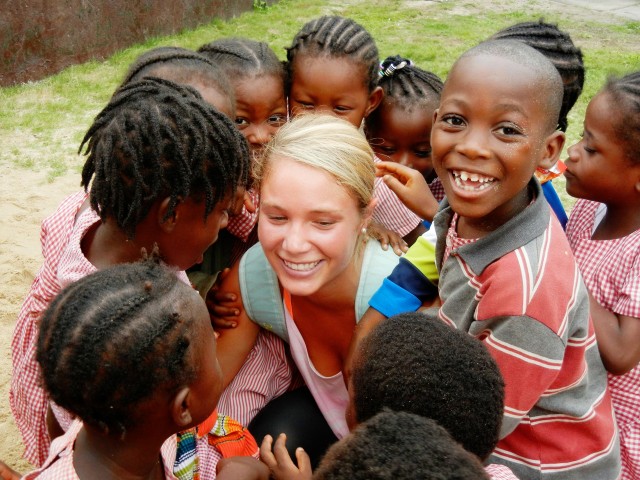Jack Hogan
Staff Writer
It’s that time of year when students begin to plan their summer break. For some, this involves booking flights and visas to work in the US. For others, it requires securing a job in their hometown in order to pay college fees. More and more students, however, are opting to spend their summer months volunteering overseas in developing countries.
In August 2013, Comhlámh (an Irish organisation promoting ethical overseas volunteering) produced a report which revealed that of the estimated 4,500 overseas volunteer placements carried out by Irish people in 2012, students accounted for 40%.
This figure has been increasing year after year as the possibility of combining volunteering with travel has become more attractive to students. So it’s not surprising then to see more and more adverts for volunteering opportunities, whether it’s on your Facebook newsfeed or on campus notice boards.
However, I have also read and heard increasing criticism of overseas volunteering in online articles and from my fellow students. It’s argued that volunteer placements are designed for the personal fulfilment of Westerners, rather than to affect change in a developing community and that it would be better to employ local staff rather than hiring unskilled foreign volunteers.
Much overseas volunteering has been branded as voluntourism. The arguments behind this are valid and important to bear in mind – having a critical view is very important in the context of global development practice. However, there is a danger in labelling all overseas volunteer placements as counter-productive voluntourism. To do so ignores the sustainable, beneficial and worthwhile work that is carried out by Irish students every summer in ethical, responsible volunteering programs. We need to be more precise about what is meant by voluntourism and to be careful not to group all volunteer-sending organizations as self-serving companies. As I understand it, voluntourism is the industry of fabricating volunteer placements to meet the demands of Westerners. Such placements generally address no skill gap in the local community, charge a very high fee to the volunteer, and are advertised as a commodity that benefits the volunteer rather than the host community.
A voluntourist-sending organization is a business – a for-profit volunteering agency rather than a charity. Its projects can be ineffective and even damaging. In contrast, there are organizations in developing countries that affect sustainable change in the local community and welcome volunteers to contribute to the work that is already being done. These organizations are non-profit, for-impact, and shouldn’t be overlooked.
I was lucky enough to volunteer for one such organization, the Umbrella Foundation, for three months in the summer of 2012. Umbrella is an Irish-registered charity based in Nepal that cares for conflict-displaced and trafficked children and seeks to re-integrate these children with their families.
For a long time, I had wanted to volunteer overseas but struggled to find an organization and a cause I truly believed in. When I read Umbrella’s volunteering guide, I was pleased to see learn about their ethical considerations.
Volunteers are asked to raise funds and awareness for the charity in their home country. Every cent raised goes towards continuing the work of the organization, putting food on the table and a roof over the heads of the children, with full financial transparency and low administration costs.
My intention in this article is not to glamorize my volunteering experience as better than another student’s summer plans, rather, it is to highlight that there are ethical, responsible volunteering placements out there for Irish students that should not be dismissed with the negative connotations of the catchall term voluntourism. The Umbrella Foundation is just one – others are listed in Comhlámh’s Code of Good Practice.
My advice to a prospective volunteer is not to be discouraged by cynical generalizations about all overseas volunteering being unsustainable and damaging. It has become quite popular to badmouth overseas volunteering but this view is short-sighted and doesn’t consider the wide range of effective volunteering placements out there or the beneficial impacts that volunteers can make on the ground.
However, in choosing a sending organization, be sure to closely examine its pricing information. A study by the Journal of Sustainable Tourism has found that those organizations with the highest fees are often the least effective so they recommend looking at transparency reports and accounts rather than just the cost. These should be available upon request.
Second, look for an organization that needs a skill that you possess. For example, if you are volunteering with children, the sending organization should require you to have experience in this area. Third, it is recommended to contact previous volunteers who have experience with a particular organization. Responsible sending organizations should offer past volunteer testimonials and contact details.
You are not going to ‘save the world’ in one summer but by contributing to the work of an ethical charity or non-profit, you can make a positive impact on the life of the local community and gain a first-hand global perspective on development issues and a cultural awareness that would not be achieved otherwise.
That is why I believe ethical overseas volunteering is one of the best things you can do during your time in college. To those considering volunteering, I advise thinking and planning responsibly about why and how you are going to volunteer and be sure to read the Volunteer Charter produced by Comhlámh. To those volunteers who have decided that they are going overseas this summer – good luck and enjoy!






